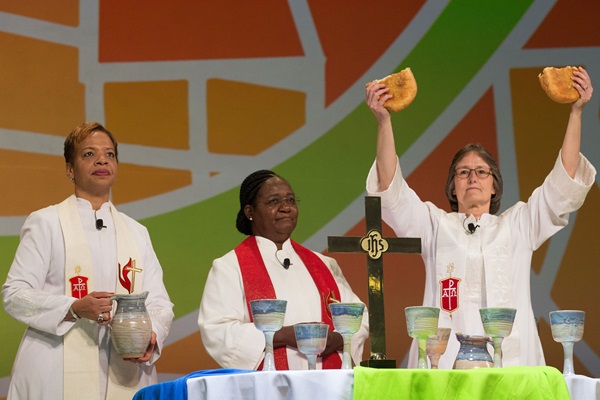Women who found movements are sometimes designated as “mothers.” In early Methodism, the women who earned this title bore it as a mark of distinction. They became revered as “Mothers in Israel,” an honorific which linked them and their piety, courage, and leadership with Deborah the Judge in the Old Testament.
The church today benefits greatly from the unique leadership of women in ministry who stand on the shoulders of their spiritual foremothers.
Then
One of the most striking characteristics of the Methodist “Mothers in Israel” was their collaborative spirit coupled with their radical obedience to God’s call upon their lives. Women like Mary Bosanquet (later Fletcher), Sarah Ryan, Sarah Crosby, and Mary Tooth belonged to a large network of female friendships. They set up house together and created alternative family structures for support, nurture, and mutual accountability as they watched over one another in love.
These ties often superseded those of family of origin. Mary Bosanquet had a strained relationship with her mother, and she came to regard Sarah Ryan not only as the “friend of [her] soul” but also to believe that God had given Sarah to her as a mother.
After Sarah’s death, Mary never again had a female relationship of that intensity, although she nurtured and mentored Sarah’s niece, Sally Lawrence, and Mary Tooth, and they both became class leaders and preachers. Mary Tooth composed a moving obituary for Mary Fletcher in which she described the profound grief of losing one who was “more than a mother,” who was also “a counsellor and friend.”
She deeply mourned the loss of “her friendship, her maternal love, and prayers,” but continued to preserve their shared legacy of faith and courage throughout the remainder of her own life and ministry.
The unconventional ministries, faithful leadership, and holy boldness of these “mothers” paved the way for the eventual ordination of their spiritual daughters and can inspire and embolden us still today.
Now
Today’s clergywomen have also created networks of mutual support and collaboration. In-person and online communities create space for members to talk through scenarios they are facing, which sometimes results in advice (if solicited) but more often in responses of solidarity and empowerment, giving each other the confidence to do what needs to be done.
For those who have no other women colleagues physically nearby, online communities are a lifeline. Real friendships may be initiated in digital spaces and strengthened by face-to-face meetings in geographic regions or yearly conventions.
At least two things that were abundantly true for early church mothers definitely hold for clergywomen today: First, we are best able to trust our calling and leadership when others affirm and uphold it. Second, our collaboration and solidarity naturally turns us outward. For example, a group of United Methodist women under 40 have now created two devotional books of prayers: We Pray With Her: Encouragement for All Women Who Lead (Abingdon, 2018) and Speak the Truth: Women Raising Their Voices in Prayer (Abingdon, 2020). We (the co-authors of this article) met through an online group for women faith writers. It is part of our calling to lift up other women leaders.
Women church leaders may still experience challenges. We are sometimes pigeonholed into roles that serve with children or youth when our gifts lie elsewhere. We are also seldom considered for senior leadership positions. Perhaps because of this, many of us have adapted less traditional ministries, such as partnerships between congregations and non-profits, art ministries, ministry coaching, spiritual direction or counseling practices on the side, or even writing books, embracing the divided attention of a multi-faceted ministry (for more on this, see the chapter “Divided Attention and Loyalty” in Pomrenke’s book, Embodied).
Like our foremothers in faith, women in ministry today seek to work within traditional church structures while remaining open to the sometimes surprising leading of the Holy Spirit. Just as the “Mothers in Israel” encountered obstacles from those who believed they were “impudent women” who should keep silent or exercise their ministries only among other women, many contemporary female ministers find their authority questioned, challenged, and ignored by those who think that ordained ministry is for men only.
In learning and sharing the stories of these courageous and faithful women, we not only acquire a more accurate understanding of our past; we cultivate a church culture that honors the dignity and worth of everyone called by God, helping to create the beloved community in all its diversity and beauty.
Donna Fowler-Marchant is an elder in the NC Annual Conference of the UMC and the author of Mothers in Israel: Methodist Beginnings Through the Eyes of Women (Wesley’s Foundery Books, 2020). She blogs at travelswithwesley.blogspot.com and maintains a Facebook page and Instagram account, both called Travels With Wesley.
Lee Ann M. Pomrenke is a Lutheran pastor in the St. Paul (MN) Area Synod of the ELCA and author of Embodied: Clergy Women and the Solidarity of a Mothering God (Church Publishing, Inc. 2020). She blogs at leeannpomrenke.com.
This story was published March 25, 2021.





